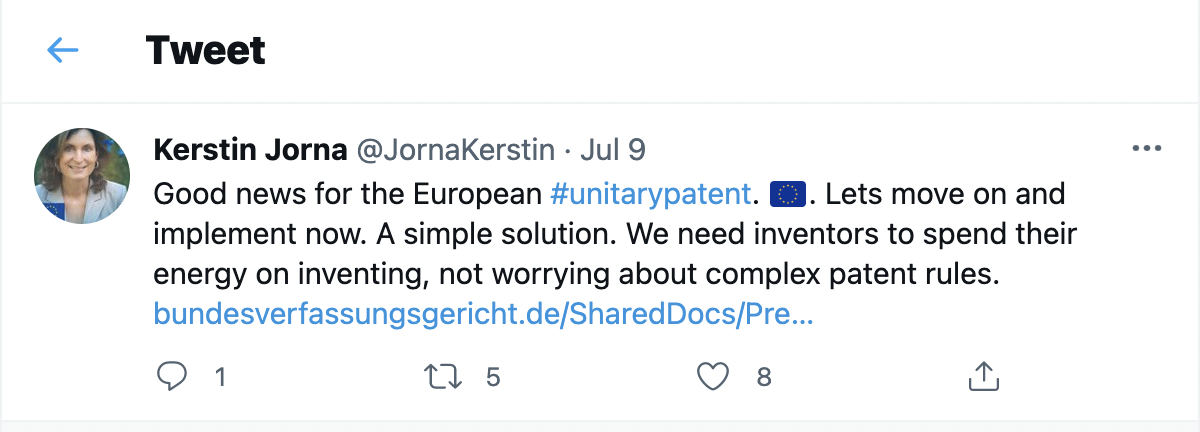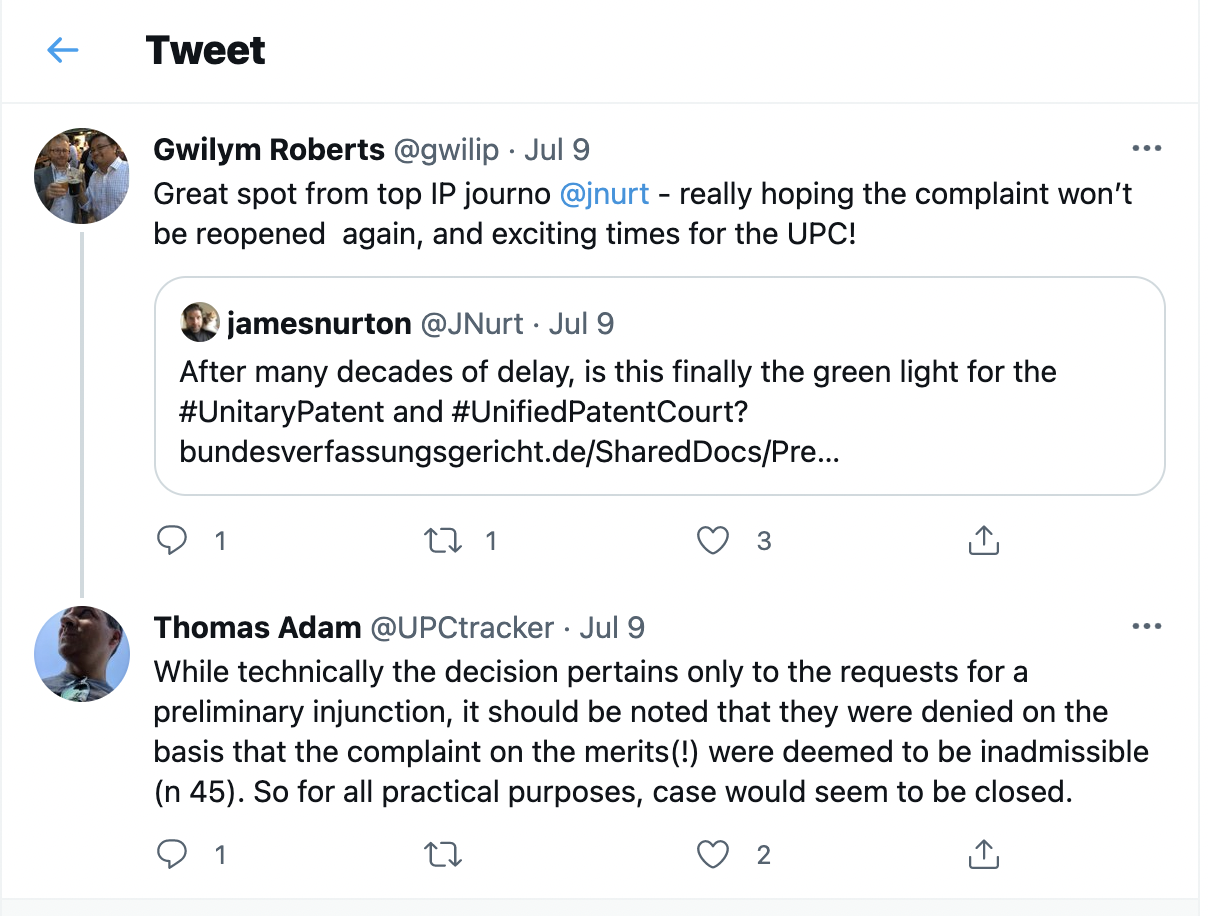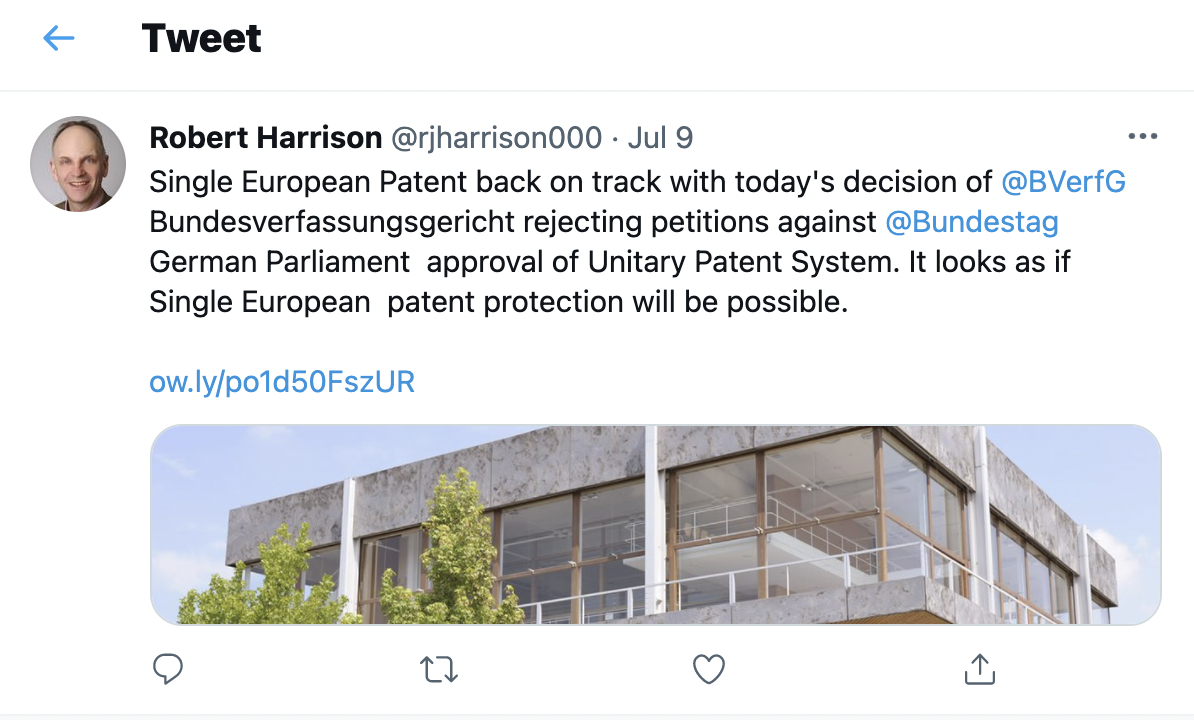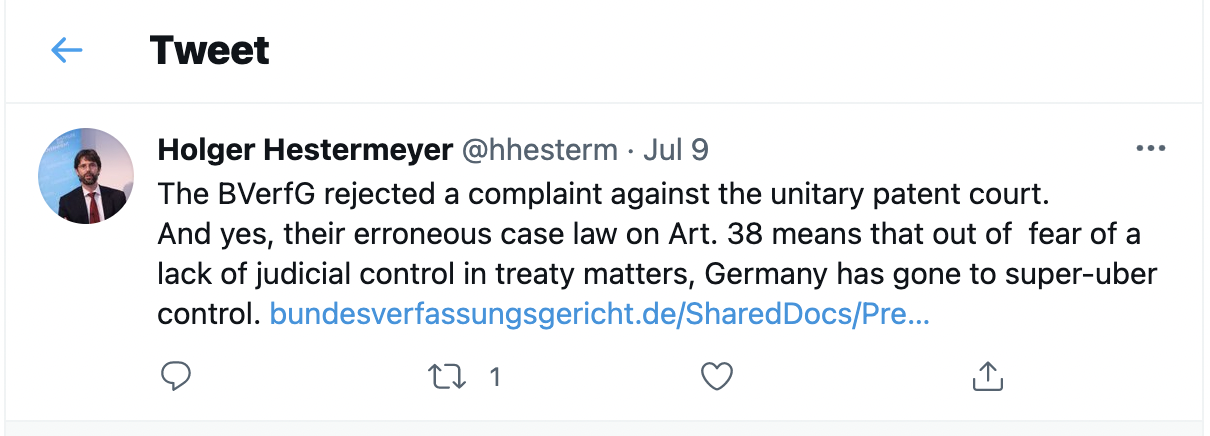“The Court’s clear rejection of the complaints as inadmissible should clear the way for Germany’s president to sign the ratification of the UPCA and the Protocol on Provisional Application.”
 The long-awaited EU Unitary Patent and Unified Patent Court (UPC) looks likely to be launched in 2022, after Germany’s top court rejected two challenges to ratification on Friday, July 9.
The long-awaited EU Unitary Patent and Unified Patent Court (UPC) looks likely to be launched in 2022, after Germany’s top court rejected two challenges to ratification on Friday, July 9.
In its decision, the Federal Constitutional Court rejected both the applications for preliminary injunction directed against the Act of Approval to ratify the Agreement of February 19, 2013 on a Unified Patent Court (UPCA). (BVerfG, Beschluss des Zweiten Senats vom 23. Juni 2021- 2 BvR 2216/20 -, Rn. 1-81.)
The English-language press summary is here.
The Court stated that the constitutional complaints lodged in the principal proceedings were inadmissible as the complainants failed to sufficiently assert and substantiate a possible violation of their fundamental rights.
This is the second time the Court has ruled on the ratification of the UPCA. It previously upheld a complaint that the Bundestag had passed the necessary legislation without the required two-thirds majority. This led to a second vote, in November 2020, with the necessary majority.
Next Steps
The Court’s clear rejection of the complaints as inadmissible should clear the way for Germany’s president to sign the ratification of the UPCA and the Protocol on Provisional Application.
Germany will be the 13th Member State to ratify the UPCA, while three countries still need to ratify the Protocol: these are expected to be Germany, Austria and Slovenia. The UPC Agreement will enter into force four months after the 13th ratification.
The Unitary Patent and UPC were agreed in February 2013, after years of efforts to negotiate a simpler, cheaper means of protecting and enforcing patents in Europe. The delay in implementation has been caused by various developments, including the legal challenges in Germany and the Brexit vote—which eventually led to the UK withdrawing from the UPC.
After implementation, inventors will be able to apply for a Unitary Patent which will be valid in all participating member states without further validation. The UPC will provide centralized revocation and infringement proceedings, avoiding duplicate actions in national courts and the risk of contradictory judgments.
Up to 25 of the 27 EU Member States are expected to participate in the system, with Spain and Poland having decided not to do so. However, not all are likely to be part of the system at launch, meaning businesses will have to consider carefully the costs and benefits of the system for their patent applications.
The Unitary Patent will provide an additional option, alongside national and European patents, for obtaining patent protection in Europe. The European Patent Office will conduct search and examination as it does as present. When the patent is granted, the proprietor can request unitary effect.
Costs will be reduced by eliminating some translation costs: after a six-year transition period, no post-grant translations will be required while translation costs will be subsidized for some applicants.
A significant advantage compared to national/European patents is that there will be one renewal procedure, rather than separate ones for each Member State. Renewal fees have been set to be comparable to the fees covering the four most popular EPC Member States.
The UPC will have local, regional and central divisions throughout the participating Member States, with its headquarters in Paris, France and an appeal court in Luxembourg. It will also have a registry, training center for judges and mediation and arbitration center. Panels will comprise legally and technically qualified judges.
Full details about the Unitary Patent and UPC are available on the dedicated website.
Here’s what the Twitterverse had to say:




Image Source: Deposit Photos
Image ID:13167070
Copyright:maurus

![[IPWatchdog Logo]](https://ipwatchdog.com/wp-content/themes/IPWatchdog%20-%202023/assets/images/temp/logo-small@2x.png)

![[Advertisement]](https://ipwatchdog.com/wp-content/uploads/2024/04/Artificial-Intelligence-2024-REPLAY-sidebar-700x500-corrected.jpg)
![[Advertisement]](https://ipwatchdog.com/wp-content/uploads/2024/04/UnitedLex-May-2-2024-sidebar-700x500-1.jpg)
![[Advertisement]](https://ipwatchdog.com/wp-content/uploads/2024/04/Patent-Litigation-Masters-2024-sidebar-700x500-1.jpg)

![[Advertisement]](https://ipwatchdog.com/wp-content/uploads/2021/12/WEBINAR-336-x-280-px.png)
![[Advertisement]](https://ipwatchdog.com/wp-content/uploads/2021/12/2021-Patent-Practice-on-Demand-recorded-Feb-2021-336-x-280.jpg)
![[Advertisement]](https://ipwatchdog.com/wp-content/uploads/2021/12/Ad-4-The-Invent-Patent-System™.png)






Join the Discussion
3 comments so far.
James Nurton
July 15, 2021 05:12 amThanks for the comment Judith. You are right about the three countries – and Italy will replace the UK (although this is not a decision made by the EPO – it’s an EU project). The Agreement also refers specifically to “London” as one of the locations of the Court’s central division so that will have to be changed.
My understanding is that a simple revision of the Agreement should be uncontroversial and would not significantly delay things – but we’ve heard that before so let’s see!
Max Drei
July 14, 2021 05:06 amJudith, where there’s a will, there’s a way. Given the mighty legal difficulties, to reconcile the UPCA (as it stands today) with existing European law, it’s going to take a mighty expression of will to bring the thing to fruition. But these days, in politics, never dismiss anything as impossible. I cite the BREXIT story as an example. Who would have guessed that the Prime Minister of the UK would divide the Kingdom (along a line running between Northern Ireland and the mainland island we call Great Britain), lie to the monarch and suspend the UK’s sovereign Parliament, just to “get it done”. There is no doubt that PM Johnson (a bit like some of the proponents of the UPCA) has a mighty will.
As to the UPCA, the will to “get it done” has been fermenting in the minds of some people ever since 1973, when patents were European-ised (in the granting phase yes but in litigation all efforts foundered at that time). So it’s still too soon to conclude that the UPCA will never come into effect.
Judith Perkins
July 13, 2021 01:35 pmArticle 89 says you needed the UK, FR and DE for the UPCA to enter into force:
“including the three Member States in which the highest number of European patents had effect in the year preceding the year in which the signature of the Agreement takes place”
Suddenly in August 2020, after the UK deratifies the UPCA, the EPO replaces the UK by Italy, re-interpreting the rules.
Can we expect another legal trick to declare it into force?